The Taiwan People’s Party (TPP) yesterday won five at-large seats to become the third-largest party in the Legislative Yuan, followed by the New Power Party (NPP) with three at-large seats.
The Taiwan Statebuilding Party obtained one regional legislator seat, while independent candidates secured five.
The TPP is a nascent party established in August last year by Taipei Mayor Ko Wen-je (柯文哲), who was elected its founding chairman, and while Ko did not run for president, the party nominated 18 regional legislators and announced a list of 29 legislator-at-large nominees.
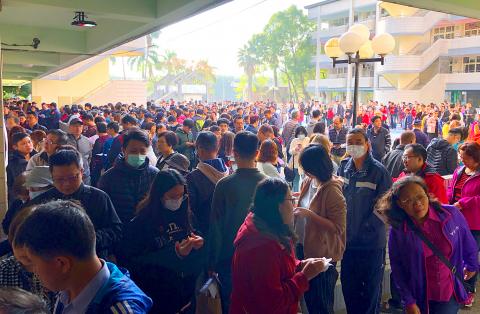
Photo: CNA
The TPP failed to obtain regional legislator seats, but secured the at-large seats by gaining 1,588,806 or 11.2203 percent of the overall political party votes.
Topping the TPP’s list of legislator-at-large candidates was Taipei Department of Labor Commissioner Lai Hsiang-lin (賴香伶), followed by National Sun Yat-sen University College of Social Science dean Jang Chyi-lu (張其祿), Hon Hai Technology Group Industrial Big Data Office vice president Ann Kao (高虹安) and World Taiwanese Chambers of Commerce secretary-general Andy Chiu (邱臣遠).
Ko has said that he hoped that with the founding of the TPP, people would be given another choice besides the Chinese Nationalist Party (KMT) and Democratic Progressive Party, and that the TPP, which favors an open and transparent government, aims to gain enough legislative seats to become a critical minority party that would keep the two major parties in check.
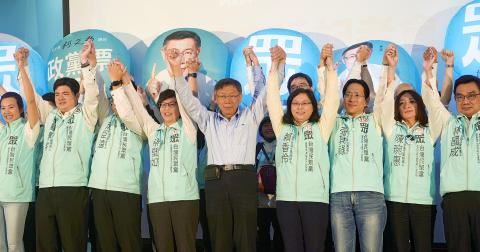
Photo: Chang Chia-ming, Taipei Times
The NPP garnered 7.7549 percent of the party votes, a slight improvement from the 6.1 percent it received in the 2016 elections.
Topping the NPP’s list of at-large nominees is environmentalist Chen Jiau-hua (陳椒華), followed by former NPP chairman and human rights lawyer Chiu Hsien-chih (邱顯智) and Claire Wang (王婉諭), whose four-year-old daughter, nicknamed “Little Lightbulb” (小燈泡), was murdered on a street in Taipei in 2016.
In the 2016 elections, aside from the DPP and KMT, only the NPP and the People First Party (PFP) obtained enough party votes to cross the 5-percentage-point threshold and secure legislator-at-large seats, receiving two and three seats respectively.
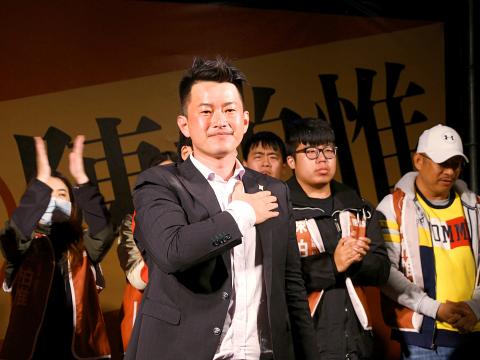
Photo: CNA
The PFP did not receive enough votes this year.
Under the “single-member constituency, two-vote system,” eligible voters can cast two ballots in the legislative elections, one for a regional candidate and the other for a party, and 34 legislator-at-large seats are distributed between the parties according to the proportion of party votes they obtain.
A record high of 19 parties ran in this year’s elections.
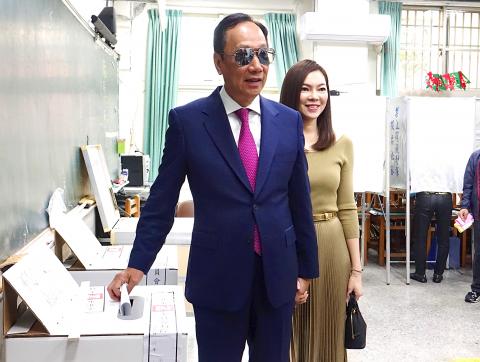
Photo: Wang Yi-sung, Taipei Times
Among the “third-force” parties and independent candidates, the most attention-grabbing legislators-elect are DPP-endorsed Taiwan Statebuilding Party spokesman Wonda Chen (陳柏惟), DPP-endorsed independent Legislator Freddy Lim (林昶佐), independent Legislator Chao Cheng-yu (趙正宇) and independent candidate Fu Kun-chi (傅崐萁).
Wonda Chen won in a traditional KMT stronghold, Taichung’s second electoral district — which includes the Dadu (大肚), Wurih (烏日), Longjing (龍井), Shalu (沙鹿), Wufeng (霧峰) districts and and part of Dali District (大里).
He is the first legislator elected from the Taiwan Statebuilding Party — formerly known as Taiwan Radical Wings — a new party founded in Kaohsiung that is considered to belong to the pro-independence camp.
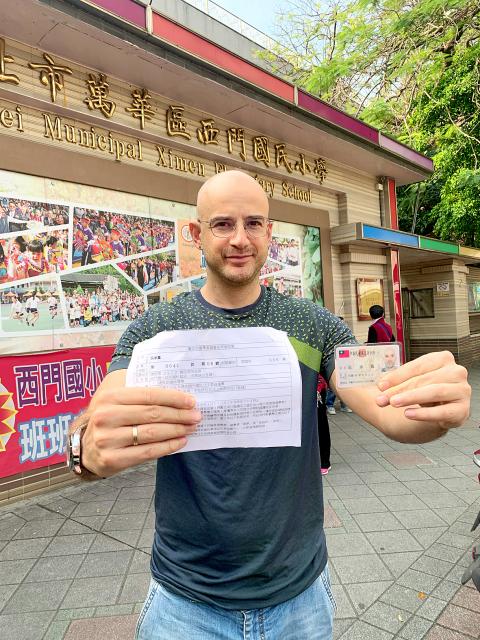
Photo: Hsiao Fang-chi, Taipei Times
Wonda Chen’s defeat of Yen Kuan-heng (顏寬恆) came as a surprise to many, as Yen has been a legislator for two terms after winning a by-election in 2013 to fill the vacant post left by his father, former Non-Partisan Solidarity Union legislator Yen Ching-piao (顏清標), after he was found guilty of corruption.
The Yen family has governed the district for more than a decade.
Lim, the frontman for metal band Chthonic, was re-elected in Taipei’s Zhongzheng-Wanhua (中正-萬華) electoral district by obtaining 81,853 votes, or 44.9137 percent, defeating former KMT legislator Lin Yu-fang (林郁方) a second time.
Lim was first elected in 2016 as an NPP member, but announced in August last year that that he would leave the party to support President Tsai Ing-wen’s (蔡英文) re-election bid.
However, DPP-endorsed independent Legislator Hung Tzu-yung (洪慈庸), another former NPP legislator who left the party in August last year, failed to win re-election in Taichung’s third electoral district.
Fu, a former Hualien county commissioner who was imprisoned for eight months between 2018 and last year for insider trading, won in Hualien County by obtaining 64,060 votes, and is to replace DPP Legislator Hsiao Bi-khim (蕭美琴).
Chao won in Taoyuan’s sixth electoral district, defeating KMT Legislator Apollo Chen (陳學聖).

Auckland rang in 2026 with a downtown fireworks display launched from New Zealand’s tallest structure, Sky Tower, making it the first major city to greet the new year at a celebration dampened by rain, while crowds in Taipei braved the elements to watch Taipei 101’s display. South Pacific countries are the first to bid farewell to 2025. Clocks struck midnight in Auckland, with a population of 1.7 million, 18 hours before the famous ball was to drop in New York’s Times Square. The five-minute display involved 3,500 fireworks launched from the 240m Sky Tower. Smaller community events were canceled across New Zealand’s

The Ministry of Foreign Affairs (MOFA) yesterday said it is closely monitoring developments in Venezuela, and would continue to cooperate with democratic allies and work together for regional and global security, stability, and prosperity. The remarks came after the US on Saturday launched a series of airstrikes in Venezuela and kidnapped Venezuelan President Nicolas Maduro, who was later flown to New York along with his wife. The pair face US charges related to drug trafficking and alleged cooperation with gangs designated as terrorist organizations. Maduro has denied the allegations. The ministry said that it is closely monitoring the political and economic situation

‘SLICING METHOD’: In the event of a blockade, the China Coast Guard would intercept Taiwanese ships while its navy would seek to deter foreign intervention China’s military drills around Taiwan this week signaled potential strategies to cut the nation off from energy supplies and foreign military assistance, a US think tank report said. The Chinese People’s Liberation Army (PLA) conducted what it called “Justice Mission 2025” exercises from Monday to Tuesday in five maritime zones and airspace around Taiwan, calling them a warning to “Taiwanese independence” forces. In a report released on Wednesday, the Institute for the Study of War said the exercises effectively simulated blocking shipping routes to major port cities, including Kaohsiung, Keelung and Hualien. Taiwan would be highly vulnerable under such a blockade, because it

UNRELENTING: China attempted cyberattacks on Taiwan’s critical infrastructure 2.63 million times per day last year, up from 1.23 million in 2023, the NSB said China’s cyberarmy has long engaged in cyberattacks against Taiwan’s critical infrastructure, employing diverse and evolving tactics, the National Security Bureau (NSB) said yesterday, adding that cyberattacks on critical energy infrastructure last year increased 10-fold compared with the previous year. The NSB yesterday released a report titled Analysis on China’s Cyber Threats to Taiwan’s Critical Infrastructure in 2025, outlining the number of cyberattacks, major tactics and hacker groups. Taiwan’s national intelligence community identified a large number of cybersecurity incidents last year, the bureau said in a statement. China’s cyberarmy last year launched an average of 2.63 million intrusion attempts per day targeting Taiwan’s critical